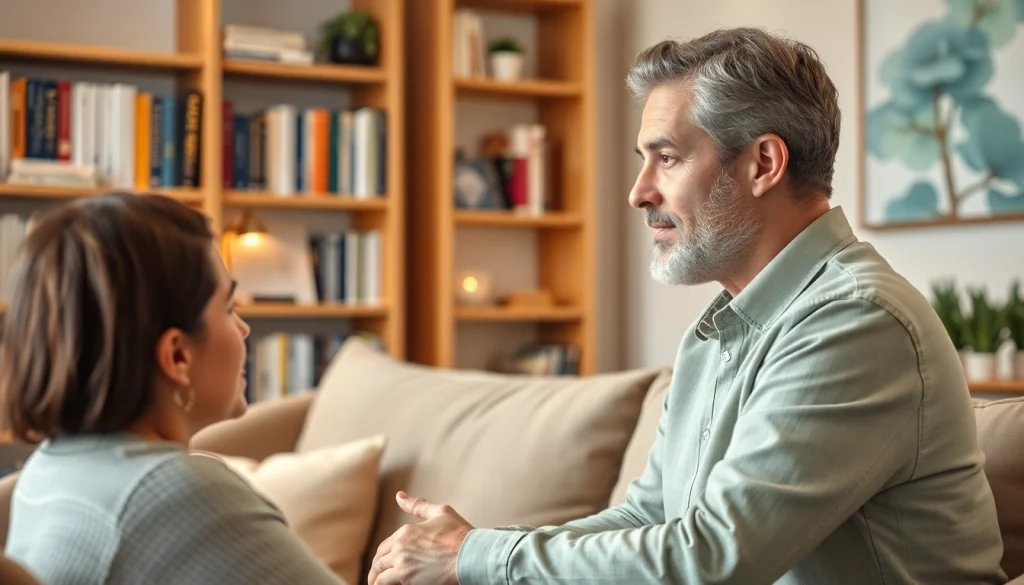What is Attachment Theory?
Attachment Theory is a psychological and evolutionary framework that explores the bonds formed between individuals, particularly between children and their caregivers. This theory has profound implications for our understanding of emotional and social development, influencing how we relate to one another throughout our lives. Understanding this concept is crucial for various fields, including psychology, education, and mental health therapy. For those seeking to delve deeper into these relational dynamics, working with an attachment theory specialist can provide invaluable support.
Origins and Key Concepts
Attachment Theory began to take shape in the mid-20th century through the pioneering work of British psychologist John Bowlby. Bowlby proposed that the strong emotional bonds between infants and their primary caregivers are essential for survival and normal psychological development. His research was groundbreaking, as it shifted the focus from purely behavioral perspectives to emotional ones. Bowlby identified that children who formed secure attachments with their caregivers were more likely to develop into well-adjusted adults.
Mary Ainsworth, a colleague of Bowlby, further expanded this theory through her “Strange Situation” experiment, which observed how children responded to separations and reunions with their caregivers. This research identified three primary attachment styles: secure, anxious, and avoidant. These styles reveal how different patterns of interaction with caregivers shape emotional regulation and interpersonal relationships.
Principles of Attachment Styles
Attachment styles manifest in various ways throughout different stages of life, influencing how we connect with others. Here are the primary attachment styles:
- Secure Attachment: Individuals with secure attachments feel comfortable seeking help and are generally able to communicate their needs effectively. They exhibit trust and are usually confident in their relationships.
- Anxious Attachment: Those with an anxious attachment style often seek validation and reassurance from their partners. They may have a fear of abandonment, leading to clingy or obsessive behaviors.
- Avoidant Attachment: Avoidantly attached individuals tend to distance themselves from emotional closeness. They often value independence, which may lead to difficulty in intimate relationships.
Importance in Psychology
The relevance of Attachment Theory extends beyond individual relationships; it provides valuable insights into various psychological constructs, including personality, self-esteem, and mental health disorders. Therapists and psychologists utilize this framework to develop effective treatment plans that address relationship dynamics and personal growth. By understanding one’s attachment style, individuals can learn to navigate their relational patterns more effectively and create healthier relationships.
Who is an Attachment Theory Specialist?
An attachment theory specialist focuses on the principles of Attachment Theory and utilizes them to foster healing and personal development. These professionals are trained to recognize the impact of attachment styles on individual behavior and relationship dynamics, helping clients forge healthier bonds.
Qualifications and Training
Attachment theory specialists typically possess advanced degrees in psychology, social work, counseling, or a related field. They undergo specific training in attachment-based therapies, including Emotionally Focused Therapy (EFT), which emphasizes the importance of emotional attunement in relationships. Many specialists obtain certifications that validate their expertise in attachment-focused therapeutic approaches, ensuring they are well-equipped to address nuanced emotional issues faced by clients.
Differences from Other Therapists
While many therapists may have a general understanding of attachment styles, an attachment theory specialist possesses deeper expertise in how these patterns affect mental health and relationships. They focus specifically on healing issues arising from attachment-related traumas, unlike general therapists who may take a broader approach to mental health without emphasizing relationship dynamics as a central theme.
Role in Treatment Plans
Attachment theory specialists develop personalized treatment plans that take into account an individual’s specific attachment style and relational history. Through therapeutic techniques, they guide clients in identifying maladaptive patterns, building emotional regulation skills, and fostering secure attachment behaviors. This tailored approach allows for a more effective healing process, addressing core issues that contribute to anxiety, depression, and relational difficulties.
How Attachment Theory Influences Relationships
Attachment Theory plays a crucial role in the way individuals navigate their relationships. It informs how people connect with friends, partners, and family, shaping interpersonal dynamics across various contexts.
Understanding Healthy vs. Unhealthy Attachments
Healthy attachments foster trust, communication, and mutual respect, while unhealthy attachments can lead to chaos and emotional distress. For instance, a secure attachment style typically results in relationships where individuals can express emotions freely and support each other without fear of judgment or rejection. On the contrary, anxious or avoidant attachment styles can create cycles of conflict, misunderstanding, and emotional withdrawal.
Impact on Friendships and Family Dynamics
In friendships and family interactions, attachment styles influence how individuals interact with one another. For example, someone with a secure attachment style is more likely to engage in open dialogues and offer support during challenging times. In contrast, individuals with an avoidant attachment style may struggle to provide emotional availability, potentially leading to misunderstandings or feelings of isolation among loved ones.
Relevance in Romantic Relationships
Romantic relationships are significantly impacted by attachment styles. Securely attached individuals typically find it easier to navigate relationship challenges, communicate needs, and foster closeness. Meanwhile, those with anxious or avoidant attachments may face difficulties in maintaining intimacy or managing conflicts. Understanding these dynamics is essential for couples seeking to improve their relational health through methods like couples therapy, where an attachment theory specialist can play an instrumental role.
Common Challenges Addressed by Attachment Theory Specialists
Attachment theory specialists deal with various challenges that stem from maladaptive attachment styles. Understanding the foundational elements of these challenges can empower individuals to seek appropriate support.
Anxiety in Relationships
Anxiety often arises from a fear of rejection or abandonment, particularly in individuals with anxious attachment styles. Such fears can lead to behaviors like excessive reassurance seeking or jealousy. An attachment theory specialist helps individuals recognize these patterns and work towards healthier emotional responses, fostering personal security and interpersonal trust.
Overcoming Past Trauma
Many individuals carry the scars of past attachment-related traumas that inhibit their present relationships. Attachment theory specialists use various therapeutic approaches to address these traumas, allowing clients to process their experiences and develop healthier relationship patterns. This may involve techniques such as narrative therapy, where clients recount their stories and reframe their understanding of past events.
Building Secure Attachments
Creating secure attachments requires intentionality and practice. Specialists guide clients in developing skills such as effective communication, emotional regulation, and boundary-setting. Through therapeutic exercises, clients can learn to establish trust and connection with others, progressing towards healthier relational dynamics.
Finding the Right Attachment Theory Specialist
When considering working with an attachment theory specialist, it is vital to find the right fit for your needs and goals. The following factors can guide your search.
Key Factors to Consider
1. Credentials: Ensure that the therapist has a sophisticated understanding of Attachment Theory and appropriate credentials.
2. Specialization: Look for professionals who specialize in attachment-based therapy or have experience in dealing with issues related to attachment disorders.
3. Approach: Consider the therapeutic approaches utilized by the specialist and whether they align with your desired treatment style.
Questions to Ask Potential Therapists
When interviewing potential attachment theory specialists, consider asking the following questions:
- What is your experience with Attachment Theory and its application in therapy?
- How do you approach therapy with clients who have experienced attachment-related trauma?
- What measures do you take to ensure a safe and trusting therapeutic environment?
How to Prepare for Your First Session
Preparing for your first session with an attachment theory specialist can enhance the effectiveness of your therapy. Here are some tips:
- Reflect on your attachment style and any relationship challenges you face.
- Be open and honest about your experiences; this allows the therapist to provide tailored support.
- Consider setting personal goals for what you hope to achieve through therapy.
In conclusion, understanding and applying the principles of Attachment Theory can significantly impact personal and relational growth. By working with an attachment theory specialist, individuals can navigate the complexities of their emotions and relationships, leading to healthier connections and a more fulfilling life.








